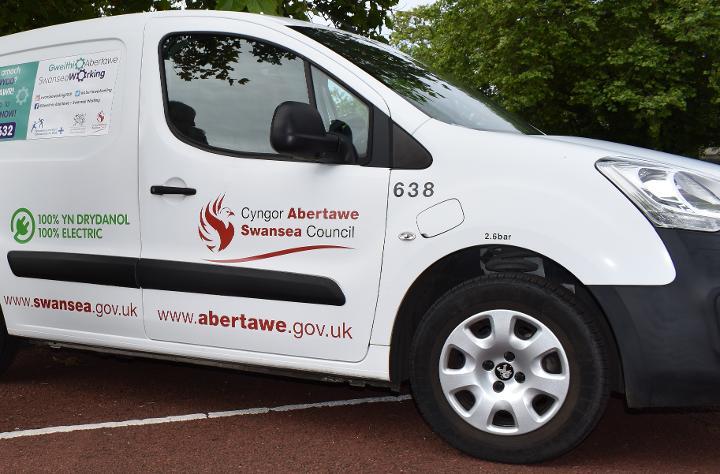Environment
Council says it’s growing green fleet is helping cut city pollution
Swansea Council have said their ever-growing electric vehicle fleet has now reached the 100 milestone.

The councils’ fleet of vehicles now includes more than 100 vans, cars, road sweepers and a refuse vehicle all powered by electricity, with more coming over the next few months.
Sixteen mechanics in its transport team have been trained-up to look after the vehicles and more charging points have been added at depots to keep them charged.
The latest addition of 35 vehicles means Swansea continues to set an example in Wales as it works towards being a carbon net zero council by 2030.
Andrea Lewis, Joint Deputy Leader Cabinet Member for Service Transformation said Swansea has the largest local authority electric vehicle fleet in Wales, helping to cut pollution in city communities, reducing the council’s carbon footprint and easing pressure on fuel costs.
She said: “Residents have always been very supportive of the council’s effort to reduce energy costs, contributing to tackling climate change. The electric vehicles we use are a daily reminder of a commitment that will continue for years to come.
“We’d like to thank the Welsh Government’s Energy Service who’ve helped fund some of the latest additions to our fleet and helped us create savings that demonstrate the investment is worth it both financially and for the climate.”
The council now operates more than 100 EV vans of various sizes as well as two new electric-powered road sweepers. It’s also collaborating with the Energy Service and other local authorities on trialling a new generation of electric-powered refuse collection vehicles with one located in Swansea.
The council’s light commercial van fleet is expected to be fully electric over the next few years with the remainder – including waste and recycling vehicles – to be ultra-low emission by 2030.
Cllr Lewis said investment in training in-house mechanics to maintain and service electric vehicles demonstrated its commitment to council staff and is a message to other organisations with large vehicle fleets that a transition from fossil fuels to electric can be done successfully.
She said: “We’ve been urging other organisations in Swansea to join us in aiming for a zero carbon Swansea by 2050. The council aims to get there by 2030. Our fleet of around 900 vehicles will be electric or ultra-low emission by 2030 as part of our pledge to do more – and do it as quickly as possible – to protect our environment from climate change.
“Our training investment in our CTU team also demonstrates how action to tackle climate change can create and protect jobs in our communities.”
Mark Barrow, Fleet Manager at the council, said the 16 mechanics’ training, provided by Gower College Swansea with the support of the Unite union, was an investment in the team’s future.
He said: “The decision to train-up our in-house team means we no longer have to rely on external providers. The maintenance team were really keen to take on and adopt these new technologies, as well as play their part in the transition to EV, and their new skills will benefit our workshop and the council in the years ahead.”
(Lead image: Swansea Council)
-



 Natural Resources Wales7 days ago
Natural Resources Wales7 days agoPenllergare Valley Woods named as one of six new National Forest sites
-



 Swansea6 days ago
Swansea6 days agoSpectacular scenes in the Swansea sky as the Aurora Northern Lights shine bright
-



 Boxing7 days ago
Boxing7 days agoThe Swansea heavyweight who is the best kept secret of the boxing world
-



 South Wales Police3 days ago
South Wales Police3 days agoPolice to use live facial recognition cameras in Swansea City Centre
-



 Armed Forces7 days ago
Armed Forces7 days agoWith her 100th birthday approaching Margaret reveals fascinating wartime past
-



 Port Talbot7 days ago
Port Talbot7 days agoJoint taskforce to tackle antisocial behaviour at Aberavon Beach
-



 Animals7 days ago
Animals7 days agoLocal housebuilder donates £1.5k to beloved animal rescue charity
-



 Swansea3 days ago
Swansea3 days agoSkatepark plans for Swansea move forward






























